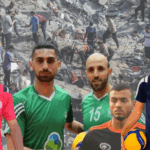Israel in a State of Denial

Image Credit: Luis Vazquez/Gulf News
By Ramzy Baroud, Special to Gulf News
In his October 10 column for Israel’s Ynetnews, Guy Bechor reached a bewildering conclusion. "Israelis were the first ones of all people to raise the delegitimisation argument: Israel would turn into the new South Africa as result of its isolation in the western world, they said … However, there was never much substance to this argument, and even if there was, it was curbed in the past year."
It is baffling to see Israel’s mainstream intelligentsia challenging the very idea they themselves inserted into public consciousness. They hurled accusations of anti-Semitism at the supposed ‘delegitimisers’, and also terrified their own people with doomsday scenarios.
One enthusiast of the delegitimisation theory is Israeli opposition leader and chairwoman of the Kadima party, Tzipi Livni. "The threat of delegitimisation intensifies other threats facing Israel, and limits our ability to protect ourselves," she said at a conference organised by her party and the Interdisciplinary Centre in Herzliya. "Israel’s missiles, tanks and excellent fighters can’t properly protect the state of Israel if their hands are tied behind their backs," she added, according to Haaretz (August 24, 2010).
Livni was the most visible orchestrator of the war on Gaza in 2008-09. The war on the besieged Strip — which was already devastated by an unprecedented humanitarian crisis — killed more than 1,400 Palestinians and wounded nearly 5,500. Many rights reports accused Israel of committing war crimes and crimes against humanity during the 22 days of intense air strikes.
Yet the international outcry was hardly enough to ‘tie’ the hands of Israel’s ‘excellent fighters’, nor to slow down the pace of its bulldozer drivers and construction workers, who wreaked havoc in occupied East Jerusalem and the West Bank. More, hundreds of Palestinians have since been killed and wounded in Gaza, as Israel insisted on breaking the tacit truce reached with Palestinian factions there. As for the siege, it continues despite the release of captured Israeli soldier, Gilad Shalit last month.
So why is Israel so infuriated by the alleged delegitimisation campaign? Is it possibly because the global Palestinian rights campaign has crossed the traditional boundaries of Israel’s conflicts into an arena that cannot be dealt with using white phosphorous, fighting jets and unmanned drones?
Commenting in the Jerusalem Post recently, Caroline Glick provides a synopsis of the problem and her proposed solution. In an article entitled ‘Delegitimising the delegitimisers’, she writes: "The only way to defeat those who deny our rights to our land, our nationhood and our history is to expose their corruption, and their hateful intentions towards the Jewish people."
Not only is the statement grossly bizarre and untrue — Israel ought to be criticised in proportion to its unlawful action, and should be treated like any other country that deliberately and repeatedly violates international and humanitarian laws — it also does much injustice to Jewish communities everywhere.
In an article in the Electronic Intifada last month, Ali Abunimah describes such imprudent arguments — in reference to Anti-Defamation League tactics — as "inherently anti-Semitic because it assumes incorrectly and historically that all criticism of Israel equals criticism of Jews … In other words, it falsely stereotypes all Jews as mindless supporters of Israel’s atrocious policies and associates them with those policies."
Civil Society Campaigns
So what to do when the nature of the battle changes dramatically? How do you fight a battle — as Israel always perceives its problems — that is being led by civil society campaigners, writers, activists abroad small boats with medical supplies, and an international community that neither fears a US veto, nor becomes intimidated by old tactics and accusations?
While fully prepared for all sorts of combats, Israel is still ill-equipped to face civil society, which is growing increasingly agitated — not only at Israel’s blatant disregard of human rights, but also at the hypocrisy of western governments in allowing such violations.
Take for example the recent vote in the UN Educational, Scientific and Cultural Organisation (Unesco) to admit the state of Palestine as a full member. Instead of using the vote by Unesco — which represents the entirety of the international community, and is credited for its awe-inspiring peacetime efforts — as an opportunity to further cultural and political dialogue, the US and Israel resorted to name-calling and arm-twisting.
Both countries froze payments to the UN body totalling up to $82 million. And while Israel decided to unlawfully withhold taxes collected on behalf of the Palestinian National Authority, US Congress members are now pushing legislation aimed at the collective punishment of countries and international bodies that side with an independent Palestinian state.
Such behaviour might intimidate an institution, a newspaper, or even a government, but they will not deter the international civil society. Moreover, Israel can successfully test ballistic missiles, but it cannot shake the isolation it has invited upon itself through its own violent and illegal actions. The vote in Unesco was an expression of the international community’s dissatisfaction with Israel, and its eagerness to peacefully resolve the conflict.
It is bewildering indeed that, despite all of this, writers such as Guy Bechor are now celebrating the triumph of Israel over its critics. "The prevalent feeling up until a few years ago, that everything is permitted in the battle against Israel, is no longer dominant," he wrote.
Considering the mounting international solidarity with Palestinians, and the vibrancy of the Boycott, Divestment and Sanctions movement, it is truly difficult to understand the self-congratulating Israeli position.
– Ramzy Baroud is the editor of PalestineChronicle.com. He taught mass communication at Australia’s Curtin University of Technology. His latest book is My Father Was a Freedom Fighter: Gaza’s Untold Story.










































0 Comments